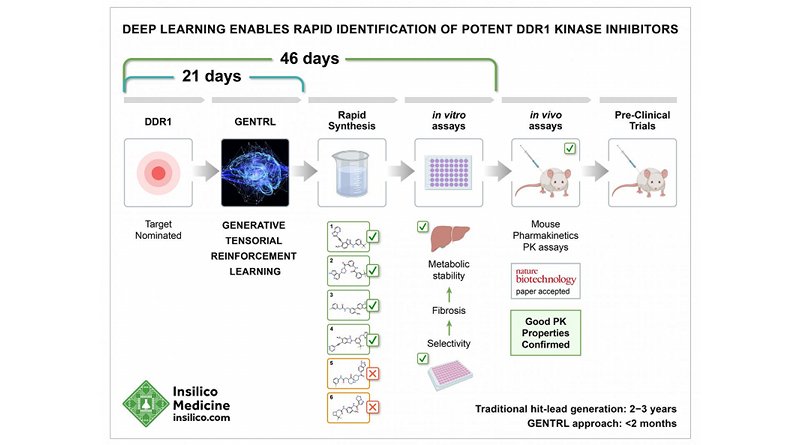Novel Molecules Designed By Artificial Intelligence In 21 Days Are Validated In Mice
Insilico Medicine, a global leader in artificial intelligence for drug discovery, announced the publication of a paper titled, “Deep learning enables rapid identification of potent DDR1 kinase inhibitors,” in Nature Biotechnology. The paper describes a timed challenge, where the new artificial intelligence system called Generative Tensorial Reinforcement Learning (GENTRL) designed six novel inhibitors of DDR1, a kinase target implicated in fibrosis and other diseases, in 21 days.
Four compounds were active in biochemical assays, and two were validated in cell-based assays. One lead candidate was tested and demonstrated favorable pharmacokinetics in mice.
The traditional drug discovery starts with the testing of thousands of small molecules in order to get to just a few lead-like molecules and only about one in ten of these molecules pass clinical trials in human patients. Even a slight improvement in the time it takes to discover new drugs or in the probability of success results in significant savings and public benefit.
The authors of the paper pioneered the field of generative chemistry with seminal publications in 2016 and experimental validation of the molecules generated by GENTRL represents a valuable milestone on the path to more efficient drug discovery powered by artificial intelligence.
Insilico Medicine is developing a comprehensive drug discovery pipeline utilizing artificial intelligence generating novel molecules with the specified properties for a variety of target classes and challenging targets with and without crystal structure rapidly generating leadlike hits. This pipeline was specifically developed to rapidly validate prospective targets with small-molecule chemistry and allow for rapid pharmaceutical drug discovery.
“This paper is certainly a really impressive advance and likely to be applicable to many other problems in drug-design. Based on state-of-the-art reinforcement learning, I am also very impressed by the breadth of this study involving as it does molecular modeling, affinity measurements, and animal studies,” said Dr. Michael Levitt, professor of structural biology, Stanford University. Dr. Levitt received the Nobel Prize in Chemistry in 2013.
“I interacted with many AI startups in the past and Insilico was the only deep learning company with impressive, demonstrated capabilities integrating target identification and small molecule discovery. They did a lot of theoretical work in GANs from the very beginning and this experimental validation is a significant demonstration that this technology may improve and accelerate drug discovery,” said Dr. John Baldoni, CTO of a stealth AI-powered drug development startup and former SVP of Platform Technology and Science at GSK.
“Reduction of cycle time and overall cost of goods is critical to the future success of Pharma drug discovery activities. In this paper, Insilico highlight a novel AI based technology (GAN-RL) which allowed them to identify lead molecules with efficacy in animal models in notably short timeframes. If this technology proves broadly useful it may well have transformational potential for future lead generation efforts,” said Dr. Stevan Djuric, Adjunct Professor, School of Pharmacy, High Point University and former Vice President, Discovery Chemistry and Technology, Abbvie.

